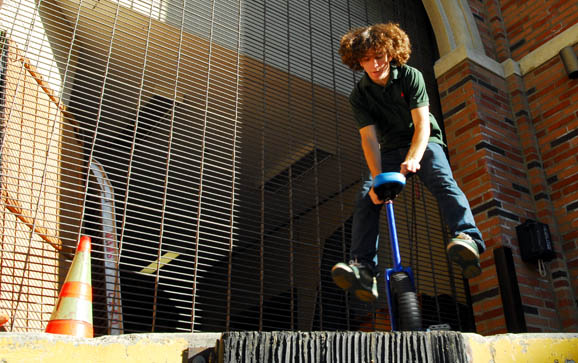UCLA unicyclist dominates sport

A competitor on the international level, Spencer Hochberg practices his unicycling craft daily on the UCLA campus, either outside Hedrick Hall or on his way to class down Bruin Walk. Hochberg has been unicycling for about six years, beginning when he was, as he described, an “unbalanced and unathletic” kid.
By Ryan Eshoff
Oct. 21, 2009 10:21 p.m.
Spencer Hochberg wrote the book on unicycling.
No, but seriously, this time it’s more than a cliché: The second-year mechanical engineering student and single-wheeled specialist actually composed the rule book that is used by the International Unicycling Federation in the world championships of flatland unicycling. The curly-haired Santa Clarita native and his unicycle are practically attached at the hip, and make up one of UCLA’s most unique sights.
It’s hard to describe Hochberg and his exploits in a word. Phelps-esque? Federer-ian? Since first picking up the sport in eighth grade, Hochberg has ridden his way into the elite echelon of unicyclists, achieving the top ranking in North America for street unicycling in 2007 and flatland unicycling in 2008.
Not bad for a guy who at age 13 was a self-described “unbalanced and unathletic 4-foot-9-inch kid who didn’t really have anything to do,” and thus found himself a unicycle.
After dabbling in skateboarding throughout his junior high years, Hochberg found his calling on one wheel and has been in love with the sport ever since.
“At first, the fact that unicycling is unique makes it so cool,” Hochberg said. “People don’t see too many of them, and they become a bit of a novelty.”
This is certainly true for Hochberg at UCLA; he can’t wander far from his dorm at Hedrick without being recognized as the guy who unicycles down Bruin Walk by day and outside of the dorms by night.
“If I ride to class or anything, everyone stares at me,” Hochberg said. “That, or I can hear people talking about me right behind me. I get recognized all over the place, even in the elevator. That’s kind of cool.”
For the obvious social and academic reasons, Hochberg has trouble finding as much time for unicycling these days as he did in high school. But when he is riding, he is working on “flatland” unicycling, the style of the sport that is most comparable to a rap battle or a dance-off: two riders going head-to-head, trying to put together combinations of tricks to outdo the other. At the end, a winner is determined.
Flatland is a relatively new mode that combines elements of many unicycling styles.
As a world-renowned rider, Hochberg travels all across the globe to perform in exhibitions and compete in tournaments. Hochberg has flown to Denmark, Minnesota and Cologne, Germany, to demonstrate his skills.
In addition to globe-trotting, another benefit of being a top rider is the opportunity for sponsorship; Hochberg rides for Kris Holm Unicycles, named for the team’s founder and the world’s most famous unicyclist. Holm sees the team, which features about a dozen of the top international cyclists, including Hochberg, as an opportunity to popularize the sport.
“Over my own riding career I’ve had major opportunities in many places,” Holm said. “Supporting a team worldwide feels like a positive way to give back. Riders like Spencer who make lots of videos also expose the sport to a lot of people who otherwise would never see it.”
Second-year business economics major David Tracy, another avid UCLA unicyclist, feels that exposure is a flummoxing problem for the world’s unicyclists, most of whom embraced the difficulties of beginning the sport and go on to enjoy the originality that it offers.
“The sport appeals to me because it is unique and is as challenging as I care to make it,” Tracy said. “Unicycling will remain a relatively obscure sport because most people don’t have the persistence and time required to learn to ride.”
As one of two of the campus’s most identifiable single-wheelers, Tracy appreciates the rarity and uniqueness of the sport, and has nothing but respect for his colleague.
“Spencer can perform as well or better than any unicyclist I have ever seen in the circus, on the Internet, or otherwise,” Tracy said. “He’s a great guy who’d be out teaching his floor mates to ride. I’d be lying if I didn’t say Spencer is the best unicyclist I have ever met.”
Despite its status as somewhat of a niche sport, those involved with unicycling feel its recognition is rising, slowly but surely.
“It’s definitely getting more popular,” Hochberg. “The street style is picking up more. It’s not as much of a weird thing, and in countries all over the world it’s becoming more and more mainstream.”
“Most people underestimate the size of unicycling, because it’s not a major media sport,” Holm said. “That said, it will never become truly mainstream because the initial learning curve is too steep.”
For Hochberg, the sport has been such an important part of his life that he can’t see himself giving it up anytime soon. And while the rankings, prizes and accolades are impressive, he’s really in it for much simpler reasons.
“I’m definitely more about the fun side of unicycling,” he said. “I don’t even really care for competing that much, I’d much rather go to the event and just hang out with people. I want to keep riding as long as it keeps me happy.”
Chances are that being one of the world’s best, even if that’s not his motivation, will do just that.
As for that steep learning curve? Hochberg has ascended it and stands alone on top of it ““ one of a kind, like the wheel of his ride.


